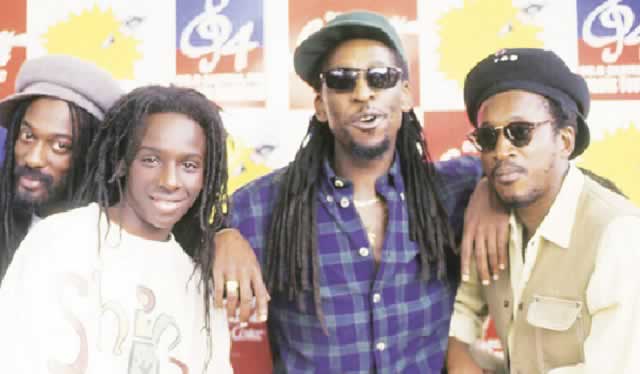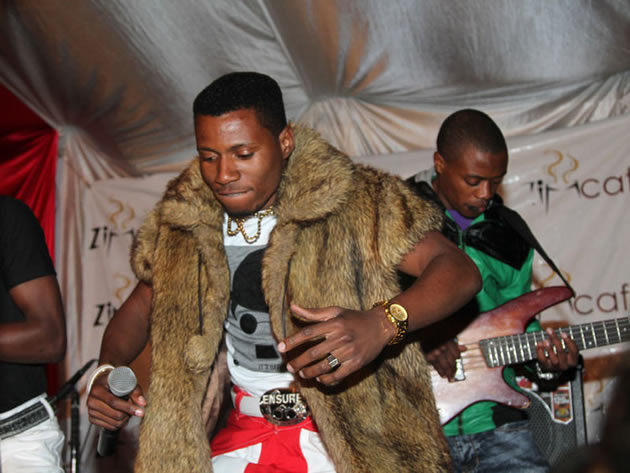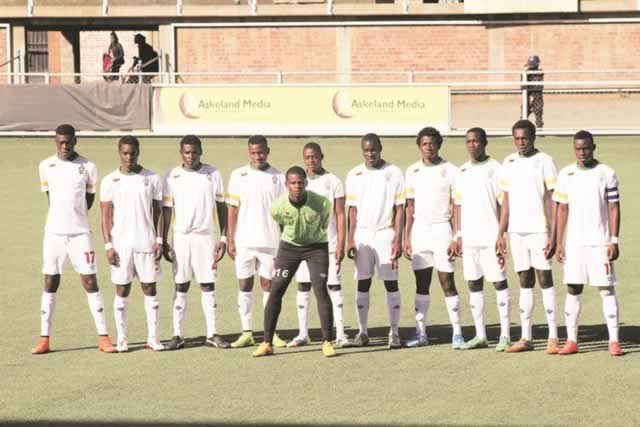Aswad’s Brinsley Forde honoured

Fred Zindi Music
Congratulations are in order on the awarding of a MBE to one member of the group, ASWAD which I was involved with for years.
Those of you who are old enough will remember that in the early 1980’s I brought the group ASWAD to Zimbabwe. They performed to full capacity audiences at City Sports Centre, Rufaro Stadium and Bulawayo Showgrounds.
In this group were members, Angus Gaye a.k.a.DrummieZeb who played the drums and vocals, Tony “Gad” Robinson on bass and vocals and Brinsley “Chaka B” Forde on lead guitar and vocals.
According to the Jamaican Observer, Brinsley Forde, a founding member of reggae band Aswad, was made a Member of the Order of the British Empire (MBE) last Tuesday at Buckingham Palace in England.
In case you are not clear what MBE stands for, here is an explanation. It is the Most Excellent Order of the British Empire (often shortened informally to “Order of the British Empire”) for the “order of chivalry of British democracy” which is aimed at rewarding service in a wide range of useful activities. It was established on 4 June 1917 by King George V, and comprises five classes, in civil and military divisions, the most senior two of which make the recipient either a Knight if male, or dame if female. Past musician recipients include Sir Cliff Richard, Sir, Elton John, Sir Paul MacCartney and Sir Rod Stewart. Brinsley Forde now joins these ranks by receiving the honour and award of Member of the Most Excellent Order of The British Empire.
The 61-year-old Forde was awarded the MBE by Prince William. His son, music producer Jermaine Forde and 80-odd year-old mother Stella, attended the ceremony.
Brinsley Forde, who has now cut off his shoulder-length dreadlocks, spoke to the Jamaica Observer about being recognised by the British Crown.
“So far it has been positive in the feeling it has generated. So many good vibes with shouts that it was an achievement that lifted the spirit of the community,” he said. “My mother is very proud and that makes me happy. Giving thanks to my son, I’m blessed with another grandchild, that comes into this world with the knowledge he can achieve whatsoever he may choose to do.”
“Britain has changed drastically yet remains the same. Our culture, music language, etc, has integrated into the British society,” Forde said. “Sometimes you hear some youths talking, and if you don’t see them it’s become impossible to know where they’re from.”
Indeed some Black youths in Britain have integrated into British society that their accents have become so English and it becomes impossible to tell whether they are originally from Africa of the Caribbean. It is Brinsley Forde’s music that has helped with this integration of communities and indeed, he deserves to be honoured.
Forde was born in London to Guyanese parents. He started his entertainment career in the early 1970s as a teen actor on British shows like ‘Here Come the Double Deckers’ when he was attending Holland Park School in London..
He found fame later that decade with Aswad which released a series of hard-hitting songs that railed at racism against British minorities during the 1970s and early 1980s.
Most of those songs, including ‘Not Guilty’, ‘Not Satisfied’ and ‘African Children’, were written or co-written by Forde.
Aswad’s sound and look became more mainstream in the late 1980s, their most commercially successful period with songs like ‘Don’t Turn Around’. The band’s transformation seemed to reflect a social transformation in Britain.
In 1982, at the peak of the band’s success with a song titled ‘Roots Rocking’, I invited ASWAD to Zimbabwe. It was this tour that inspired me to write my first music book which I titled “Roots Rocking In Zimbabwe”.
Initially the band produced music in the Roots Reggae-vein, with members contributing songs individually but with Forde acting as the band’s principle songwriter. The band’s dynamics soon began to change however.
Shortly after the release of their self-titled debut album in 1976, Hemmings who was the bass player, left and was replaced by Tony “Gad” Robinson (the only time in the band’s history where a departing member would be replaced by an incoming musician).
The band then released their second studio effort, Hulet, in 1978, before Oban another member who played percussion, departed the band in 1979, with Robinson taking over Oban’s role in addition to Hemmings’. The following year saw Griffiths, a lead guitarist, depart, leaving Forde as the band’s sole guitarist. During this early period in the band’s history they were distinctly different from Jamaican reggae acts, in that they wrote songs that dealt with the issues surrounding the experiences of black youths growing-up in the UK; such as “Three Babylon” and “It’s Not Our Wish”, and the powerful jazz-influenced “Warrior Charge”.
Once the band’s line-up had stabilised into the trio of Forde, Gaye, and Robinson, Aswad followed a more commercial Reggae style, gaining a wider audience with the New Chapter album (1981). “Love Fire” gained wide recognition when it was used as the backing rhythm for Dennis Brown’s “Promised Land”.
Among Aswad’s catalogue of hits is “Don’t Turn Around”, a UK No. 1 hit in 1988, originally recorded by Tina Turner as a B-side to her “Typical Male” single. They followed this up with UK No. 11 hit “Give A Little Love”, and a reggae-flavoured rendition of “Best of My Love”, first popularised and written by The Eagles. In 1989, they contributed the single “Set Them Free” to the Greenpeace Rainbow Warriors album. In the same year they performed together with Sir Cliff Richard the song “Share A Dream”, recorded the previous year, at Wembley Stadium as part of The Event (16 and 17 June 1989). Their next hit, “Shine”, was released in 1994.
It must be noted that when ASWAD began to make the hits that rocked the UK charts, it was no longer Brinsley Forde on the vocals but Angus Gaye, the drummer. This did not go down well with Brinsley, but since there was more money coming to the band, they stayed together.
My friend, King Sounds, analysed it well to me. “Brinsley is pissed off, but as long as the money keeps pouring in, they will stay together”.
The band also hold the distinction of having played with each one of Bob Marley’s ex-Wailers. They even did the video to ‘Buffalo Soldier’ after Bob Marley died.
ASWAD toured extensively, playing in diverse locations from London’s Royal Albert Hall where they were the first Black band to perform in a venue traditionally set for performances for the queen of England only and Reggae Sunsplash in Montego Bay, Jamaica, to gigs in Zimbabwe, West Africa, Israel and Japan.
Aswad suffered their first line-up change in sixteen years in 1996, when Forde departed the band for ‘spiritual reasons’; leaving Gaye as the only founding member left in the band’s line-up. Once again the remaining members opted not to seek to recruit a replacement musician to the line-up, and thus Aswad became a duo of Gaye and Robinson. With the exception of a brief reunion with Forde in 2009 for the Island record label’s 50th anniversary celebrations, the band’s line-up has remained the same to the present day.
The band is still going with Tony and Angus as the only members, but uses session musicians for live performances. Some of the session musicians include the Ruff Cut Band with members such as:
Stanley Andrew — lead guitars, rhythm guitars, acoustic guitars, vocals Clifton “Bigga” Morrison — vocals, keyboards, melodica Martin “Tatta” Augustine — lead guitars John Kaipye — guitars Jimmy “Senyah” Haynes —lead guitars, acoustic guitars Michael “Bammie” Rose — saxophone Vin “Trommie” Gordon — trombone Eddie “Tan Tan” Thornton — trumpet Carlton “Bubblers” Ogilvie — keyboards Jimmy “J-Slice” Neath — trumpet Paul Garred — guitars Michael Martin — keyboards Patrick Tenyue — trumpet Henry ‘Buttons’ Tenyue — trombone Brian Edwards — saxophone Trevor Edwards — trombone Perry “Lion” Melius — drums Kenrick Rowe —drums Paul Slowley — drums.
Aswad released their most recent material in 2009, with the album ‘City Lock’. They released singles “What Is Love?” and “Do That Thing” in the same year.
I met Brinsley Forde in London’s Ladbroke Grove area in 2010. He had gone back to acting and he was also recording a solo album. Tony and Angus were also working on a follow-up album to ‘City Lock’ .
It is indeed an honour for me to have worked with this group and I must say that I am very proud of Brinsley’s achievement.
Sir Brinsley Forde and the rest of the Aswad team, we wish you luck in all your future endeavours.
Feedback: [email protected]









Comments